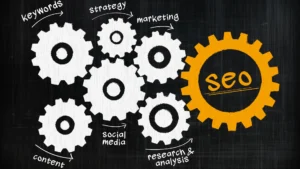When it comes to buying or selling a home, trust is just as important as expertise. Clients want more than a knowledgeable agent—they want someone they feel comfortable with, someone they can count on through one of the biggest financial and emotional decisions of their lives.
That trust begins well before the first phone call.
Most people start their real estate journey online, quietly evaluating agents through Google searches, Instagram, websites, and reviews. If what they find feels polished, professional, and genuine, they’re more likely to take the next step. If it doesn’t, they move on—often without you even knowing they were looking.
In this article, we’ll explore the key digital touchpoints real estate professionals can use to build credibility, foster rapport, and attract serious clients before meeting them in person.
Your Website Is the New First Impression
Your website isn’t just a digital business card—it’s your 24/7 storefront. For many potential clients, it’s their first real interaction with your brand. Just like curb appeal matters when selling a home, design, structure, and user experience matter online.
A strong real estate website should:
-
Build confidence instantly
A modern, mobile-friendly design shows visitors you’re professional and current. An outdated or cluttered site can create doubts about your service. -
Make it easy to take action
Whether scheduling a consultation, browsing listings, or submitting a form, your site should guide users clearly. Confusion leads to lost visitors. -
Showcase your value
Testimonials, recent sales, and local expertise set you apart. Your homepage should clearly communicate why clients should choose you. -
Reflect your personality and brand
Buyers and sellers want to feel like they know you. Professional photos, a personal “About” section, and approachable, confident copy help make that connection.
In a competitive market, a high-quality website isn’t just nice to have—it’s a trust-building tool working for you 24/7.

SEO: Getting Found by the Right People
A beautiful website doesn’t help if no one finds it. That’s where SEO, or Search Engine Optimization, comes in—it’s what gets your site in front of people actively searching for real estate services.
SEO does more than improve rankings; it builds trust by:
-
Signaling credibility
Ranking on the first page of Google tells visitors you’re a reputable, serious professional. -
Targeting your local market
Optimizing for location-specific keywords like “homes for sale in [Your City]” or “best real estate agent in [Neighborhood]” connects you with buyers and sellers ready to act nearby. -
Providing helpful content
Blogs and guides such as “The Complete Guide to Buying a Home” or “5 Things Every Seller Should Know” show your expertise and help ease client concerns.
Good SEO brings you the right visitors, increasing the chances that site traffic turns into genuine leads.
Social Media: Building Relationships One Post at a Time
Social media is more than sharing pretty photos—it’s a way to connect, build relationships, and show the real person behind your business.
Here’s why social media matters for building trust:
-
Show your expertise and personality
Market updates, behind-the-scenes glimpses, client success stories, and community events help break down barriers and build familiarity. -
Leverage social proof
Reviews and comments on platforms like Facebook and Instagram reassure prospects that others trust and recommend you. -
Stay top of mind
Regular posts keep you visible, so when someone is ready to buy or sell, your name is the first they think of. -
Use video to connect deeper
Short videos—home tours, market insights, Q&A sessions—let people hear your voice and see your passion firsthand.
The key is authenticity and consistency—don’t just post for posting’s sake. When done right, social media becomes a natural extension of your relationship-building.

Lead Nurturing CRM: Turning Interest Into Action
Attracting leads is just the beginning. The real work—and results—come from nurturing those leads, and that’s where a Customer Relationship Management (CRM) system shines.
A good CRM helps you:
-
Track every lead and interaction
Keep all inquiries, preferences, and appointments organized so nothing slips through the cracks. -
Personalize your communication
Automated messages tailored to where the client is in the buying or selling process show attentiveness without extra effort. -
Identify your hottest leads
Lead scoring helps you focus on prospects most likely to convert, making your follow-ups more efficient. -
Measure and improve your process
Insights from your CRM reveal what’s working and what needs adjusting.
By combining your digital marketing with a strong CRM strategy, you transform casual visitors into loyal clients through timely, relevant communication.
Turning Online Connections into Real Estate Clients
Trust is the foundation of every successful real estate relationship—and it starts long before you meet face-to-face. A polished website, smart SEO, authentic social media, and effective lead nurturing all help build your reputation and attract serious buyers and sellers.
Using a comprehensive digital marketing approach positions your business for steady growth and stronger client relationships. These tools don’t just bring visitors—they help convert interest into action.
At Hit Marketing, we help real estate professionals build trust and grow their business with marketing solutions tailored to showcase your expertise and keep you connected with your audience.
Ready to take your real estate marketing to the next level? Call us at (951) 906-9171 or fill out our contact form to learn how we can help you build lasting trust and win more clients online.





